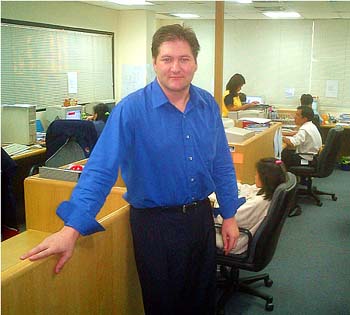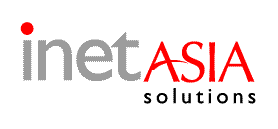
by

 |
Call him a technical whiz or financial expert, but whatever you label Greg Smyth (pronounced Smith) his career is a blueprint to follow for Canadians thinking of starting out in Asia or opening a business in Thailand. |
 |
Born and raised in Ottawa, Greg did his undergraduate degree
at the University of Western Ontario, majoring in languages. Why languages and
the arts? Well, both his parents were educators and when he was 13, his father,
who worked as a principal, took a sabbatical in the south of France for a year
and took his family with him. As a result Greg ended up spending a fair bit of
time traveling and visiting major museums and art galleries throughout Europe.
This passion for travel also lead to some excursions in-between degrees,
visiting Eastern Europe (just after the fall of communism), Turkey, India and
South East Asia during the Gulf War.
Greg went on to
Dalhousie University in Halifax where he received his MBA in Finance and
International Business. While there he came to link his financial acumen with
his IT skills when he worked on a Canadian government export program where he
and his classmates were teamed up with local technopreneurs in Halifax in order
to try and help them sell their products. The term project saw the class travel
to Dublin, Ireland, for a couple of weeks, where Greg was teamed up with an
individual who had written an integrated one number ordering solution for Pizza
Hut in Halifax. The trip proved a success as a distributor was found which later
lead to sales in the Middle East.
So after graduating
from Dalhousie, he decided to move to Hong Kong as it was the place through his
travels that struck him as the most dynamic in the world. It was a big ‘leap of
faith’ and his classmates thought he was crazy to depart without employment or
extensive contacts. But looking back over his career, he says he has no regrets
and coming to Asia was his single best decision.
So in September of
1993 he arrived in Hong Kong and within a month he had a job doing corporate
finance work for a small Canadian investment firm. He also brought with him the
one number ordering solution, which after a year of persistence; he eventually
found a distributor in Bangkok who sold it to Bill Heinecke’s Pizza Co., nee
Pizza Hut.
In early 95, Greg switched jobs and joined Barclays de Zoete Wedd Asia (BZW), working in equity research, creating regional financial products for fund managers around the world. Although it was very finance focused, the tie-in with technology was that Greg and his team had to build a lot of analytical tools, and sophisticated spreadsheets to do their work.
Then in early 98, at the height of the Asian economic crisis
Barclay’s was eager to divest itself of its Asian equity research unit so it
sold BZW to Credit Suisse First Boston (CSFB). Greg was retained as a consultant
and was granted a license to go off and develop new versions of the equity
research modeling system and decided to head out on his own. He also went back
to school and did an intensive corporate finance course at INSEAD.
His connection with
Thailand was that while he was with BZW, the regional research initiative that
he was part of was launched here, so he spent a lot of time in Bangkok and he
had consultants working on the ground here. So when he got his license to
continue developing his products it only made sense for him to hire the people
he had been working with previously in Thailand.
In the middle of
1998 he received BoI approval and started Global Financial Solutions (GFS) in
Bangkok (now Inetasia). The BoI was keen to attract software companies, so he
was off and running. GFS’ original mandate was to hire 12 people, but by the end
of 98 Greg had 30 working for him.
In the fall of 98,
he signed a licensing agreement for his suite of financial tools with Donaldson,
Lufkin and Jenrette (DLJ), a big US investment bank with the Donaldson being
William Donaldson, currently head of the US Securities Exchange Commission. GFS
weathered the Asian economic storm because it was doing a lot of its business
with DLJ at a time when the US economy was still strong. (In the deal, Greg
signed with DLJ, so even though he was licensing them technology, he actually
had to work for them as an employee). And as DLJ had its Asian headquarters in
Hong Kong, Greg traveled back and forth between Hong Kong and Bangkok on a
regular basis.
Then at the
beginning of 2000, DLJ agreed to convert the license agreement into an equity
stake whereby Greg would run the business as a separate entity. He had been
under an exclusive license with DLJ, preventing him from selling to anyone else.
So at the height of the tech boom, Greg once again decided to set off own is
own, but CSFB (who else?) then bought DLJ in the fall of 2000. This gave Greg a
hard lesson in diversifying revenue, because he lost his biggest client
overnight through the buyout.
This came in
conjunction with the tech meltdown, which saw several dot.com projects that the
company was working wind down as the firm headed into a tech recession. The
result, 2001 was a very hard year for Greg’s company. 2002 was tough as well,
and things are just starting to turn around for the company this year, as it
will return to profitability.
When the chips are
down, Greg has proved to be a pretty good fundraiser. But things change quickly.
In early 2000, when he did the license conversion with DLJ, and things were
rosy, he went out and raised USD250,000 in a week. Then later in the year, after
the CSFB buyout of DLJ and he was struggling to keep the company going he raised
another USD500,000, but it was exceedingly difficult and took a long
time.
Greg stopped doing
the Hong Kong shuttle service when he stopped working for DLJ as there was no
longer a need for him to spend so much time there. He had the operation in
Thailand, which he couldn’t run out of HK, without a major client in HK. So in
mid-2001 he decided to move to Bangkok permanently.
Today, Inetasia has several products that can help your
business but the most popular is its ‘Site Manager’ solution. Site Manager
enables companies from enterprise level to SMEss to manage their websites
without the need of programming skill or special expertise. The system is
tailored to the global market and can handle multiple languages, including
double-byte character sets.
It’s in version 4
now and been sold in multiple countries and it’s the backbone infrastructure
tool that powers websites for such high profile companies like Tesco Lotus,
Amari and UBC here in Thailand. Inetasia is in the process of setting up
distribution channels to sell it globally.
If Greg has a complaint here it’s that there is a lack of
understanding for the software industry in Thailand, and he says the lack of
capital for intellectual-capital driven projects is going to hinder software
development. Nevertheless, he intends to put Thailand on the map for software
development.
Ed.
Note: By the way, Greg played
varsity hockey at both Western and Dalhousie, and he’s a very good player. He’s
led the Hong Kong Selects to a number of championships throughout Asia over the
past decade. And his younger brother Brad, who the Hockey News once
claimed as having ‘the best hands in the American Hockey League’ has played for
a number of NHL teams and is currently in the Ottawa Senators system.
Contact Info
Tel:02-655-5440-2
Fax: 02-655-5443
Website: http://www.inetasia.com/
Email: gsmyth@inetasia.com
FINIS